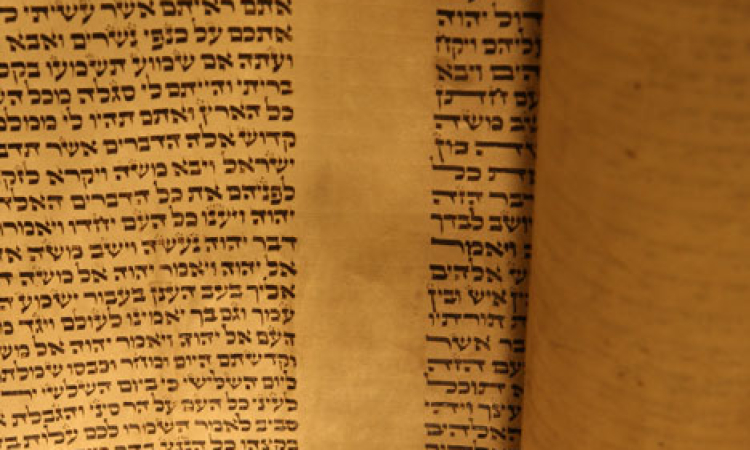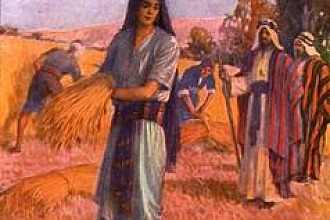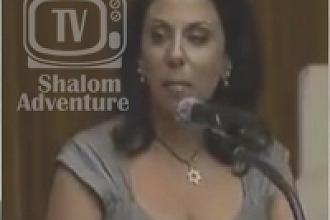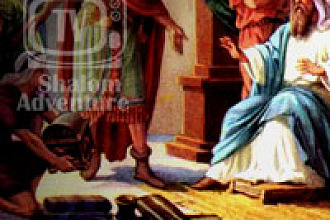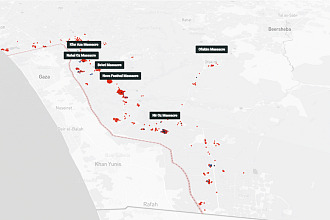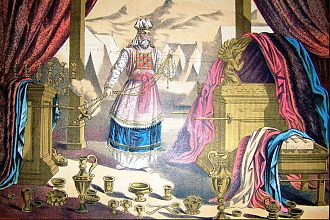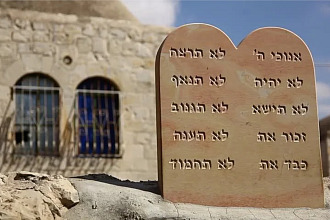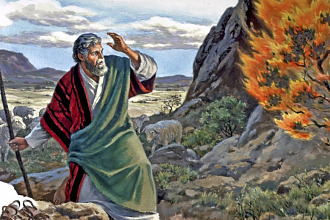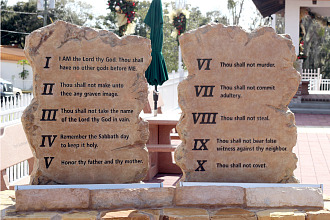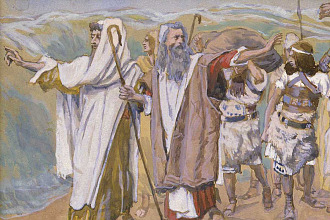Parasha for the Week: Matot/Massei Numbers 30: 2 - 36:13
Aftarah for the Week: Jeremiah 1:1 - 3:4
Apostolic Writings: Acts 18 – 21
Overview Matot:
Moshe teaches the rules and restrictions governing oaths and vows, especially the role of a husband or father in either upholding or annulling a vow.
The people of Israel wage war against Midian. They kill five Midianite kings, all the males and Bilaam. Moshe is upset that women were taken captive, as they were catalysts for the immoral behavior of the Jewish People. He rebukes the officers. The spoils of war are counted and apportioned. The commanding officers report to Moshe that there was not one casualty among Bnei Yisrael. They bring an offering that is taken by Moshe and El’azar and placed in the Obel Mo’ed (Tent of Meeting).
The tribes of Gad and Reuven, who own large quantities of livestock, petition Moshe to allow them to remain east of the Jordan and not enter the Land of Israel.
Overvew: Massei
The Torah names all 42 encampments of the children of Israel on their forty-year journey from the Exodus until the crossing of the Jordan River into the Land of Canaan.
G-d commands the people of Israel to drive out the Canaanites from the Land of Canaan and to demolish every vestige of their idolatry. The children of Israel are warned that if they fail to rid the land completely of the Canaanites, those who remain will be “pins in their eyes and thorns in their sides.”
The boundaries of the Land of Israel are defined, and the tribes are commanded to set aside 48 cities for the Levi’im, who do not receive a regular portion in the division of the Land.
Cities of refuge are to be established: Someone who murders unintentionally may flee there.
The daughters of Tzelofchad marry members of their tribe so that their inheritance will stay in their own tribe. Thus ends the Book of Bamidbar/Numbers, the fourth of the Books of the Torah.
“Vows and Oaths”
Mattot begins with the laws of vows, called in Hebrew, Nedarim: “Whenever a man makes a vow to ADONAI or swears an oath to obligate himself by a pledge, he is not to violate his word but do everything coming out of his mouth.” (Numbers 30:1-2). The general law of vows also applies to women: “Suppose a woman in her youth vows to Hashem or obligates herself by a pledge in her father’s house.” (Numbers 30:3). However, when one vowed to transgress a commandment of the Torah, he or she was prohibited from fulfilling the vow. A personal vow cannot override God’s commandment. We have already vowed at Mount Sinai to keep and observe all the Commandments.
some commentators affirm that since in the first verse of this parashah, Moses spoke to the leaders of the people of Israel, this recommendation to keep promises and vows, is first addressed to the leaders, and it concern leaders. A man could wish a position of leadership among God’s people, and in his prayer, he asks God to appoint him for such or such position, making a promise, “O Lord, allow me to be a leader upon your people, if you do it for me I promise that I will do this or that” Then when the member is appointed he must keep his promise and accomplish what he said. However, if that is true for the leaders, it is also true for any members who make a promise to God. This law is also an invitation to be very careful on what we promise, and which vow we vow to God.
Let’s remember the story given in the book of Judges about Jephthah made a vow to Hashem saying “Then Jephthah vowed a vow to Hashem and said, ‘If You will indeed give the children of Ammon into my hand, then it will be that whatever comes out of the doors of my house to meet me when I return safely from the children of Ammon, it will be Hashem, and I will offer it up as a burnt offering.’” (Judges 11:30–31), what a crazy vow, How Jephthah could imagine that offering a human being as a burnt offering could please God? After winning the war, he came back home, “Now when Jephthah arrived at his home in Mizpah, behold, his daughter was coming out to meet him with tambourines and with dances. Now she was his only child. Besides her he had no son or daughter.” (34), he was sorry that it was her who came first, but he kept his vow: “Then at the end of two months she returned to her father, who did with her according to his vow he had made—so, she was never intimate with a man. So, it became a custom in Israel, that the daughters of Israel would go annually to commemorate the daughter of Jephthah the Gileadite four days in a year.” (Judges 11:39–40). It is very important not to make unrealistic or non-biblical vow, when we pray to Hashem.
This commandment of Numbers 30:3 teaches us the significance and implications of words we speak and vows. Indeed, the third of the Ten Commandments, “You must not take the Name of Hashem your God in vain.” (Exodus 20:7) The Jewish tradition has associated this prohibition with what we say. Rabbi Zalmen Marozov says that words and speech are a very powerful tool. In fact, the creation of the universe, as told in the beginning of the Torah, came about through God’s words! God’s “sayings” are not in any way related to our form of speech. Yet, the fact that the Torah relates that the world was created by God’s “sayings” tells us how important words are — they can have the power to build or to destroy. (Torah.org).
This is why Jews use the term Bli Neder; which means “without a vow” when making a commitment. For, even with the best intentions, one never knows if he will be able to honor it. Thus, when making a pledge or commitment whether in business or otherwise it is always best to say Bli Neder (without a vow).
The Talmud has long discussion about this mitzvah of the vows, let’s remember that Rabbi Yehuda Hanassi, the compiler of the Mishna categorized the Oral Law into six orders, the Shisha Sidrei Mishna. The third of the six orders is Seder Nashim, the laws concerning relationships between men and women. The third booklet in Seder Nashim is Mesichta Nedarim. This booklet discusses the definitions and interpretations of the differing phraseology which may be used when invoking a vow or oath.
Speaking about making vows, Rashi comments: “He shall not profane his word…he should not make his words mundane.” (Rashi, Numbers 30:3). The Torah here enjoins us not to misuse this power by speaking nonsense or uttering vows that we will later profane.
We must remember that the Jewish people have established the service and prayer of Kol Nidré on the eve of Yom Kippur to make all vows who have not been kept during the year void. Rabbi Katz says: “When a Torah scholar annuls a vow, he is able to do so because the person who made the vow presents evidence that he took the vow without proper forethought. He declares that, had he thought of such-and-such or known this-or-that, he never would have taken the vow. Speech without proper thought is not human speech, and that is why the Torah scholar may declare it null and void, as if it never existed. Proper speech, on the other hand, is thoughtful speech. (Maharam Shick Al Taryag Mitzvot)” (Torah.org)
There is more about this verse of Numbers 30:2-3; it teaches the rules and restrictions governing “vows” neder and “oath” shevuah. It is important to understand the difference between these two concepts and words. Rabbi Hirsch says that “we have here two categories: 1. a man who vows a vow to the Lord. and 2. a man who swears an oath to bind himself by a pledge. An example if a man says that wine shall be forbidden to him like a sacrifice, then drinking wine is forbidden to him by a neder. If he says that he swears that he will not drink wine, then drinking wine is forbidden to him by a shevuah.”
Haftarah: Jeremiah 1:1 – 3:4
Jeremiah eremiah is reluctant to accept G-d’s calling. He understands G-d’s law as written in Mattot; he knows that we must not make a promise or a vow and then not keep it (Numbers 30:2). Can G-d break his word? Even though Jeremiah was a member of a cursed family, he finally accepted his calling because G-d was calling him to be a prophet, not a priest in Jerusalem! This was a great risk for him, and he knew that the people of Israel might not hear his words because he was one of the infamous cohanim of Anathoth, but he took the risk. Even though G-d comforted him: “‘Do not be afraid of them! For I am with you to deliver you.’ It is a declaration of Hashem” (1:8), he paid a heavy price during his twenty-three years of ministry.
First, G-d wanted to know if Jeremiah is in tune with Him: “Moreover, the word of Hashem came to me, saying, ‘What do you see, Jeremiah?’” (11a). G-d wants to see if what Jeremiah sees is exactly what G-d has shown him: “I answered, ‘I see an almond branch.’ Then Hashem said to me, ‘You have seen correctly, for I am watching over My word to perform it.’” (11b–12). G-d is watching over His words. That is why we can be sure that the words of G-d in the Bible are preserved carefully by G-d, and that the prophets and the scribes after them have faithfully written and accurately copied the Word of G-d. We can trust the Bible because G-d has watched over it.
The next revelation to Jeremiah is directly about the future of the city of Jerusalem and where the disasters will come from: “The word of Hashem came to me a second time, saying, […] ‘From the north, disaster will be poured out on all the inhabitants of the land.’”(Jeremiah 1:13-14). Disaster will come from the Tsafon, meaning “the North.” The North is a place where the sun does not penetrate, it is a place of obscurity, and from this obscure place will come the kingdoms that will penetrate Jerusalem and will destroy its walls (15). Why? Because the people of Judah have forgotten their G-d: (16). Jeremiah is now commanded to say this to Israel – to the poor, the priests, the officials, the princes and the king: “Now, you, gird up your loins! Get up and tell them everything that I order you! Do not be terrified by them, or else I will terrify you before them. Look, today I have set you up as a fortified city – an iron pillar and bronze walls – against the whole land, against the kings of Judah, its princes against its cohanim, and against the people of the land.” (17-18). As we have said, Jeremiah will pay a price, and G-d informs him: “‘Though they will fight against you, they will not win, for I am with you, to deliver you.’ It is a declaration of Hashem.” (19).
Then begins chapter 2 which is a cry of love from G-d: “I remember the devotion of your youth, your love as a bride, and the way you followed Me in the wilderness, in a land not sown.” (2:2). The period in the wilderness is a reminder and another connection between the parasha and the Haftarah. During the time in the wilderness, the people of G-d are in the desert living a sort of honeymoon with G-d. Jeremiah reminds Israel of the time of their first love in the desert. However, in the desert Moshe reproaches G-d’s people and their leaders for their unfaithfulness. “Moshe was angry…” This is exactly what Jeremiah says in the following chapters of his book.
The unfaithfulness of Judah in the time of Jeremiah is so stark that the rebellions of Israel in the wilderness are like nothing in comparison. In the wilderness, Israel followed G-d, was faithful to G-d, and had her first love for Him. That is why G-d repeats again what He said in Deuteronomy: “Israel was kadosh to Hashem, the first-fruits of the harvest.” (2:3). Israel was kadosh – that means they were holy. G-d does not see the sins of Israel when they are ready to repent and come back to His commandments: “For you are a holy people to Hashem your G-d—from all the peoples on the face of the earth, Hashem your G-d has chosen you to be His treasured people.” (Deuteronomy 7:6).
Apostolic Writings: Acts 18 – 21
It is important to see what the Brit Hachadasha says about vows and oaths. First Yeshua reinforced this mitzvah from Hashem, He invited us not to swear or to make unnecessary vows, that is why he said “Simply let your ‘Yes’ be ‘Yes,’ and your ‘No,’ ‘No’; anything beyond this comes from the evil one.” (Mat 5:37). The mitzvah of the vows and oath could be used for a good purpose or a bad purpose. In the Brit Hachadasha We have an example with Rabbi Shaul (Paul) taking a vow before going to Yerushalayim. “Paul stayed on in Corinth for some time. Then he left the brothers and sailed for Syria, accompanied by Priscilla and Aquila. Before he sailed, he had his hair cut off at Cenchrea because of a vow he had taken.” (Acts 18:18). This manner of making a vow and cut his hair off is a Jewish custom, to fulfill the law of a Nazirite, as it is written: “And the Nazirite shall shave his consecrated head at the entrance of the tent of meeting” (Numbers 6:18). Let’s remember that Rabbi Shaul did not deny Judaism when he met Yeshua on the road of Damascus and accepted him as the Mashiah of Israel. He was faithful to the tradition of his ancestors before accepting Yeshua as well after. He was a Torah observant Jew. That is why when he stopped his trip in Ephesus for the Shabbat, he went to the synagogue, the text says: “They arrived at Ephesus, where Paul left Priscilla and Aquila. He himself went into the synagogue and reasoned with the Jews.” (Acts 18:19), he did not go to the synagogue only to preach Yeshua, but first to pray, to celebrate and to keep the Shabbat in the best way he could, Several times in the book of Acts it is said that he went to the synagogue or a place of prayer “every Shabbat.” Of course, Shaul was a great Rabbi, he knew how to preach, how to share the Bible with Jews, how to share Yeshua HaMashiach with the Jewish people. It is almost naturally that the Jews were interested by Shaul’s teaching, Jews are always curious to listen to new rabbis. The text continues “When they asked him to spend more time with them, he declined.” (Acts 18:20). Shaul had a plan, it was to be in Yerushalayim for the next feast, that is why he could not stay with them, the text continues: “But as he left, he promised, “I will come back if it is God’s will.” Then he set sail from Ephesus.” (Acts 18:21). In the text of Acts we also have an example of bad use of vows, they were pronounced by some Jews who were against Rabbi Shaul and his divine message: “The next morning the Jews formed a conspiracy and bound themselves with an oath not to eat or drink until they had killed Paul.” (Acts 23:12). I don’t know how people of G-d can imagine that they can make a vow to kill someone and think that they are in agreement with the will of God. It is exactly the same behavior we see today among extremists and terrorists who kill in the name of Allah and think that God agrees with them and will give them paradise. Extremism is not only in one religion, but is a danger in every religion, that is why we have to be very careful to have a balanced view of God and our religion, and never go to one of the extreme, both, extreme left and extreme right are not good. And what is strange is that these people go to the cohanim and the Sanhedrin in Jerusalem to unveil their plan, but Shaul’s nephew knew what was going on and went to the Roman commander and said to him about their plan: “The Judean leaders have agreed to ask you to bring Paul down to the Sanhedrin tomorrow—as if they are about to investigate more thoroughly about him. But do not give in to them, for more than forty of them have bound themselves by an oath not to eat or drink until they have killed him. Even now, they are ready and waiting for your consent.” (Acts 23:20–21). The Sanhedrin was composed of 70 elders, if more than forty of them wanted to kill him, it was the majority, thus in this way he had no chance to escape. They are ready to kill, they go to say it to the cohanim, the representative of God. Paul was saved because his nephew reported this plot to the Roman commander who helped him to escape this trap.
Thus coming back to the chapter 18 and 19 we see that after his trips and teaching Rabbi Shaul decided to continue his journey to Yerushalayim in order to fulfill his vows to the Lord, “After all this had happened, Paul decided to go to Jerusalem” (Acts 19:21). In Jerusalem Paul was not alone to go to the temple to fulfill his vows, the brothers living in Jerusalem wanted to help him to witness among the leaders of the Temple that he was still a faithful Jew even though he was an apostle of Yeshua Hamashiach. That is why they said to him: “So do what we tell you. We have four men who have a vow on themselves. Take them, and purify yourself along with them and pay their expenses, so that they may shave their heads. That way, all will realize there is nothing to the things they have been told about you, but that you yourself walk in an orderly manner, keeping the Torah.” (Acts 21:23–24). We don’t know what was their vows and even the vows of Paul, but these vows were important enough to push him to take the risk to go to Jerusalem, even though he knew that this trip would be dangerous, the Ruach Elohim inspired the brothers to say to Paul not to go to Jerusalem, “They kept telling Paul through the Ruach not to set foot in Jerusalem.” (Acts 21:4), Paul was confident, He knew very well Jerusalem, he studied there at the foot of Gamaliel, he was known by the Sanhedrin and the Cohanim in charge of the service, it is from them he got letters of recommendation for the leaders of Damascus just before he met Yeshua, he was sure that nothing bad could happen to him. However on his way to Yerushalayim, he made a stop in the house of Philippe in Caesarea, and there another prophet named Agabus came to him from Judea and did a symbolic gesture: “He came to us, took Paul’s belt, tied his own hands and feet, and said, “The Ruach ha-Kodesh says this: ‘In this way shall the Jewish people in Jerusalem bind the man who owns this belt and deliver him into the hands of the Gentiles.’ ” (Acts 21:11). In the mind of Shaul it was too late, he made the vow, the Kol Nidré on Yom Kippur did not exist, he had to go to the end of the process written in the Torah. Shaul answered to the brethren: “What are you doing, weeping and breaking my heart? For I am ready not only to be bound but to die for the name of the Lord Yeshua!” (Acts 21:13).
Thus, arriving in Jerusalem, his first visit was for the leaders of the kehilah of Yeshua: “When we arrived in Jerusalem, the brothers and sisters welcomed us gladly. On the next day, Paul went in with us to Jacob; all the elders were present. After greeting them, he reported to them in detail what God had done among the Gentiles through his service. And when they heard, they began glorifying God.” (Acts 21:17–20). It was a great moment of worship and thanksgiving for the community, if it was only for this moment, it worth that Shaul came to Jerusalem, at that time there was no social network, no internet or even phone. The news were spread only by travelers, now, it was good for the leaders to hear this good news of the rapid spreading of the gospel and the growth of the new movement.

